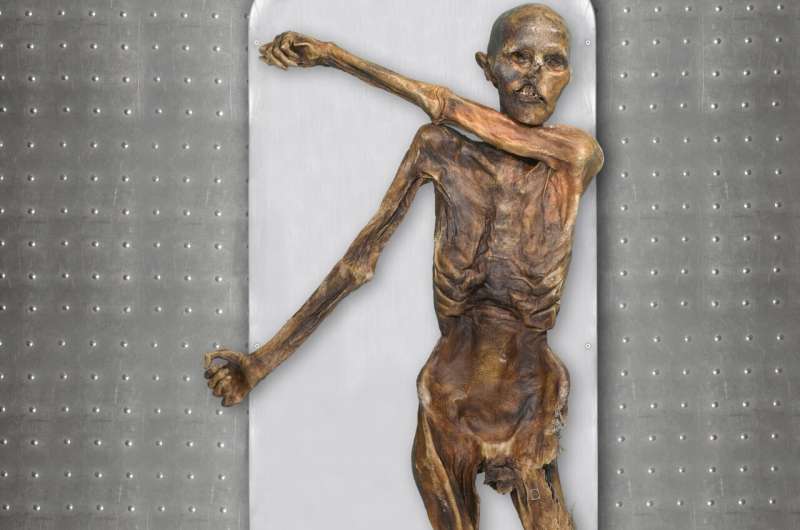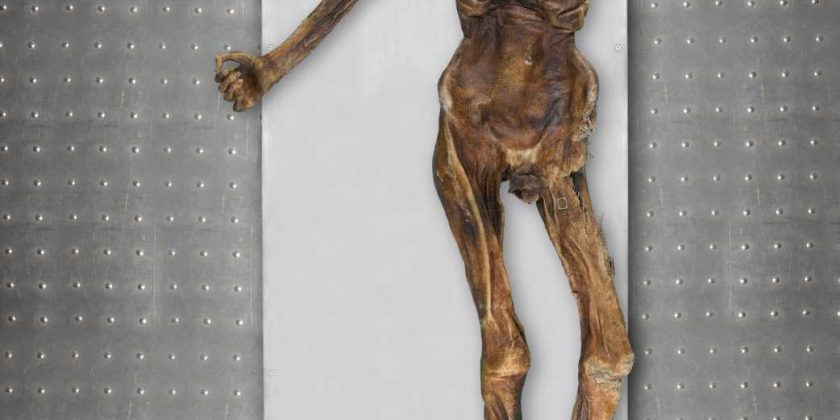
The Neolithic Tyrolean Iceman “Ötzi” has been studied thoroughly in the past. But the latest installment, in which researchers have generated a high-coverage genome to learn more about his genetic history, still offers some surprises. A report in the journal Cell Genomics on August 16 shows Ötzi had dark skin, dark eyes, and a balding head.
“The genome analysis revealed phenotypic traits such as high skin pigmentation, dark eye color, and male pattern baldness that are in stark contrast to the previous reconstructions that show a light skinned, light eyed, and quite hairy male,” said Johannes Krause from the Max Planck Institute for Evolutionary Anthropology, Germany. “The mummy itself, however, is dark and has no hair.”
The findings suggest that the Iceman in life looked more like the mummy does today, he notes. The more complete and higher-quality genome analysis also shows that the Iceman had unusually high early Anatolian farmer ancestry, higher than any other known contemporaneous population in Europe from the 4th millennium BCE. The discovery suggests that Ötzi belonged to a rather isolated Alpine population with limited gene flow from hunter-gatherer groups.
The Tyrolean Iceman is one of the best-preserved ice mummies and the oldest by far. As such, researchers have conducted many studies to learn about who he was, including studies of the Iceman’s genomic and ancestral composition. An earlier study from 2012 generated a lower-coverage genome that offered novel insights, despite considerable contamination from present-day human DNA.
The earlier work suggested close genetic affinity between Ötzi and present-day Sardinians. But the researchers now say those conclusions were reached before more human genomes had become available. In the new study, the researchers, including Krause and Albert Zink of Eurac Research—Institute for Mummy Studies in Bolzano, Italy, sequenced Ötzi’s genome again using more recent sequencing technologies to produce a higher-quality genome. What surprised them the most was how the new data changes the picture of what Ötzi looked like.
“The most surprising results were the presence of male-pattern-baldness-related alleles supporting the absence of hair observed on the actual mummy and the rather dark skin pigmentation that is also supported by the mummy,” Zink says.
“It is remarkable how the reconstruction is biased by our own preconception of a stone age human from Europe,” Krause added.
The high amount of Anatolian ancestry came as another surprise, he says, noting that Ötzi carries more than 92% Anatolian early farmer ancestry. The finding is a reminder of the remarkable migration history of Europeans. The results also suggest that the Alps were a genetic barrier. As a result, the researchers say, the Iceman’s population didn’t exchange many genes with people north and west of the Alps.
Krause notes that it isn’t clear whether or not Ötzi is representative of people from his time and place. To answer that question, future studies would need to analyze more individuals from the same region and time period.
More information:
Johannes Krause, High coverage genome of the Tyrolean Iceman reveals unusually high Anatolian Farmer ancestry, Cell Genomics (2023). DOI: 10.1016/j.xgen.2023.100377. www.cell.com/cell-genomics/ful … 2666-979X(23)00174-X
Journal information:
Cell Genomics
Source: Read Full Article
